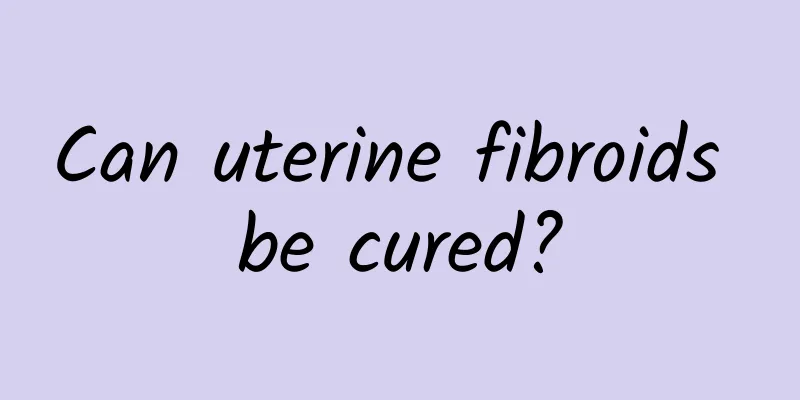What is the injection for uterine fibroids? Are there any side effects of the injection for uterine fibroids?

|
Uterine fibroids are common benign tumors in women. Many patients choose to use injections to relieve symptoms or reduce the size of the fibroids. So, what exactly are the injections for uterine fibroids? Next, we will introduce it to you in detail. What is the injection for uterine fibroids? The injections given for uterine fibroids are usually a drug called "luteinizing hormone-releasing hormone antagonists." These drugs work by inhibiting the release of luteinizing hormone from the pituitary gland, reducing the synthesis of progesterone in the ovaries, and thus reducing the growth rate and size of uterine fibroids. This class of drugs acts on the pituitary gland in the brain, blocking the secretion and action of luteinizing hormone. Luteinizing hormone is a hormone that plays an important role in a woman's menstrual cycle, promoting the proliferation and discharge of the endometrium. However, for women with uterine fibroids, luteinizing hormone can increase the growth rate of the tumor, and the use of antagonists can effectively inhibit its action, thereby slowing the growth of uterine fibroids. Side effects of uterine fibroid injections Although targeted treatment of uterine fibroids has a certain effect, there are still some side effects that need to be paid attention to during use. Common side effects include: 1. Irregular menstruation: Due to the effect of antagonists, it may have a certain impact on the patient's menstrual cycle, leading to irregular menstruation, increase or decrease in menstrual blood volume, etc. These changes are generally temporary and return to normal soon after stopping the drug. 2. Menopausal symptoms: Antagonists have a certain effect on the function of the ovaries and may cause menopausal symptoms such as hot flashes, sweating, mood swings, etc. These symptoms usually subside as the treatment progresses. 3. Decreased bone density: Long-term use of antagonists may have a certain impact on bone density and increase the risk of osteoporosis. Therefore, during the use of the drug, attention should be paid to supplementing calcium and vitamin D, and bone density tests should be performed appropriately. What is the injection for uterine fibroids? The injections for uterine fibroids are usually luteinizing hormone-releasing hormone antagonists, which are drugs that inhibit the growth of uterine fibroids by blocking the secretion and action of luteinizing hormone. Compared with surgery or other treatments, drug treatment has the advantages of being simple, convenient, and less invasive. However, drug treatment is not suitable for all patients with uterine fibroids. The selection of the appropriate population needs to be combined with the patient's specific situation and the doctor's advice. Although uterine fibroid injections can slow tumor growth, side effects are also something we need to pay attention to. Irregular menstruation, menopausal symptoms, and decreased bone density are common side effects, but they are usually short-term and reversible. If patients experience discomfort or worsening symptoms during use, they should consult a doctor in a timely manner. Uterine fibroid injections are a commonly used drug treatment method, which has significant clinical effects in eligible patients. However, the specific situation of each patient is different. Only under the guidance of a doctor and with a full understanding of the treatment principles and side effects can the most appropriate treatment choice be made. |
Recommend
Experts tell you what menopause means
Since gonadal function gradually develops from ma...
Is there a high chance of recurrence of uterine fibroids after surgery?
Is there a high chance of recurrence of uterine f...
How to treat cervical hypertrophy
Cervical hypertrophy can usually be treated with ...
What to do about habitual miscarriage caused by curettage? There are 4 ways
Because curettage is very harmful to the female b...
Aquarius is the most idealistic! 6 tips to quickly achieve your new goals in 2017
Time flies! It is now the second month of 2017. D...
The number of people with eating disorders in the UK has increased by 16%
Recently, British artist Lady Gaga was reported t...
Major hospitals for the treatment of hyperprolactinemia
A regular hospital for the treatment of diseases ...
Symptoms of Trichomonas vaginitis
Vaginitis is a vaginal inflammation caused by pat...
Let's take a look at the clinical manifestations of candidal vaginitis
Fungal vaginitis is a common type of vaginitis, s...
Clinical features of bacterial vaginosis
Perhaps many women think that bacterial vaginosis...
How to regulate irregular menstruation for women? What are the causes of irregular menstruation for women?
There are many reasons for irregular menstruation...
What to do if you have ovulation bleeding
Ovulation bleeding is a very important thing for ...
Experts analyze the four major causes of cervical erosion
It is understood that many female friends will ha...
How much does it cost to treat chronic vaginitis? What should I eat less if I have chronic vaginitis?
Due to various adverse factors, female friends ha...
Can I check my tooth decay during my period?
You can treat tooth decay during menstruation, bu...









